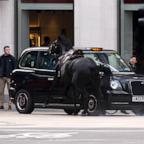Book Excerpt: 'A Life That Matters'
March 27, 2006 — -- It has been a year since Terri Schiavo died following an intense national debate about right-to-die cases. Terri had been in a semivegetative state for 15 years after she had fallen unconscious at the age of 26. Her husband, Michael, and her family were bitterly divided about whether Terri should be kept alive. Her parents defend their belief that their daughter was aware and alert, and should have continued to live in their book "A Life That Matters."
CHAPTER 1: THE COLLAPSE
The phone call woke us. I watched my husband, Bob, stumble to the living room of our small condo, a matter of fifteen steps, where he picked up the receiver. It was around 5:30 a.m., February 25, 1990. Calls at that hour could only mean bad news.
"Dad, it's Michael," the voice on the other end of the line said. "There's trouble. Terri's passed out. She's unconscious. I can't wake her up."
"Call 911," Bob shouted, and slammed down the phone.
"There's a problem with Terri," he said, coming back to the bedroom. We decided to call our son, Bobby, right away. Bobby, aged twenty-five, lived in the same apartment complex as Terri and Michael, whose address was 12001 4th Street North, in St. Petersburg. Bob went back to the phone. "Something's happened to Terri," he whispered to Bobby, barely able to get out the words. "Michael called and said he can't wake her up. You ought to get over there right away. Check it out and call me back."
Michael Schiavo claims that he called 911 before calling Bob. We know otherwise.
Numb, too shocked to feel pain, Bob returned to the bedroom again. He has always had high blood pressure, and I was watching him with anxious eyes, close to panic over him and over Terri, yet half sure that nothing really bad had happened to our daughter. We had just had dinner with her that evening. Had gone to Mass with her that afternoon. None of us realized how ominous the news was. There was nothing for us to do for the moment except get dressed and wait for Bobby's report.
Over the years, Bobby never told us fully what happened when he entered Terri and Michael's apartment. The memories were too vivid, his pain too great. But now, in tears, courageous, he told the story:
"The apartment was only two hundred yards away, but I figured it would be faster by car. So I threw on some jeans and a T-shirt, drove over, got out, and went to the third floor. Michael answered the door. I went in. Terri was lying face down in the corridor between the bathroom and the living room.
"I remember it like it was only hours ago. Her torso was on top of her arms with her hands up by her neck. I could see half the side of her face, and she was having trouble breathing, like almost a gurgling sound. I leaned down and shook her shoulders and said, 'Terri, get up. Get up.' There was no response. And it was at that moment that the paramedics knocked on the door.
"Michael let them in, and actually I think he was behind me when I shook Terri's shoulder, or to my side. At first, I wasn't overly concerned. I'd seen Terri just a few hours earlier in my apartment. She was perfectly fine. I asked her to go out with me and my roommate, Craig Hicken, that night, and she said she didn't want to because she had been fighting with Michael earlier that day and she was going to wait for him to come home. So I said okay, and I remember she ironed my pants.
"So I wasn't really concerned. I thought she had just passed out. But when the paramedics got there-as soon as they went down and assessed her condition . . . I mean, I knew it was serious. That's when I became frantic.
"They didn't say much. The only thing I remember, they wanted to know if there were drugs. They were really hitting us hard about drugs. 'Does your wife do drugs? ' 'Does your sister do drugs? 'In fact, one of the paramedics got in my face and said, 'Look, if you don't tell us that she was doing drugs, you know we're going to hold you responsible.' I think they even threatened criminal charges against me. And I knew my sister. I never knew Terri ever doing drugs. I mean, she would drink-socially drink when we went out. But never drugs. And I was adamant. 'No. She doesn't do drugs.'
"I remember the paramedics being young. I remember them hitting Terri with the defibrillators a number of times. I remember I called my dad. I went into the living room and called my dad. And didn't know what to tell him, except that she would be taken to Humana Northside Hospital. I said it was serious, but they didn't know what was wrong with her. My dad kept asking me over and over again, 'What do you think is wrong?' And I didn't know. I didn't know what was wrong. And we just waited. And they were working on her for upwards of a half hour.
"In that time frame, the police arrived, and firemen, and more paramedics. They finally got Terri stabilized enough to put her on a bed, one of those rolling beds. I remember them taking Terri out, and I remember looking at the floor. I couldn't believe all the stuff that was on the floor-trash that they were using. You know, something they injected her with, stuff they were using on her. There was just trash everywhere. Needles everywhere. So I knew there was something seriously wrong, terribly wrong, because they were injecting her with things, I guess to try to get her heart started.
"I walked downstairs. Someone was left behind-I don't know if it was a paramedic or policeman or firefighter. I said to him, 'What's going on? What's wrong with my sister?' And I remember him saying, 'If she makes it to the hospital alive, it'll be a miracle.'
"Michael got in the ambulance with Terri. I said, 'Michael, I'll be there shortly.'
"I was hysterical. I drove home, hands shaking. I called my girlfriend at the time, Julie White, to come and get me -




